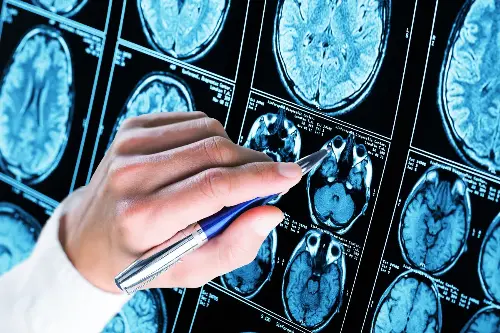
People with Type 2 diabetes are at a much higher risk for Alzheimer's disease than people without diabetes, and a new study might have unearthed the connection.
Researchers from University of Nevada, Las Vegas (UNLV) took a closer look at how type 2 diabetes alters brain activity in areas tied to memory and motivation.
Altering the Brain
The researchers found that diabetes weakens the anterior cingulate cortex (ACC)—a key part of the brain.
"The effects we found were due to altered communication between the hippocampus (a key area for memory and early Alzheimer's progression) and the ACC," lead researcher and UNLV psychology professor James Hyman told Newsweek in an email.
"This same pathway is changed when people transition from healthy aging to mild cognitive impairment (the first sign of dementia).
"This suggests that [type 2 diabetes] is also altering this pathway, which might explain the strong link between the diseases and also supports the supposition that Alzheimer's might be a progression from [type 2 diabetes]."
What is the Anterior Cingulate Cortex?
The anterior cingulate cortex, or ACC, is a part of the brain involved in higher-level thinking and emotional processing. It plays a key role in decision-making and motivation, as well as monitoring hunger or discomfort.
The ACC also helps the brain evaluate rewards and keep track of goals, making it essential for learning and memory.
Because of its central role in managing behavior and emotions, changes in ACC activity have been linked to a range of mental health conditions, including depression, anxiety and dementia.
"The ACC is a natural area to examine for working memory and its interactions with other brain areas are well documented," Hyman said.
"It also plays a key role in processing rewards and helping to shape future behavior to maximize rewards."
Why Type 2 Diabetes Affects the ACC
The researchers found that type 2 diabetes can subtly, but significantly, change how the ACC processes information.
Using a rat model of diabetes, the team discovered that high blood sugar levels disrupted how ACC neurons responded to rewards and spatial cues. Diabetic rats showed unusual patterns of brain activity—their ACC cells carried more information about where rewards could be found, but were less effective at processing the rewards themselves.
According to the researchers, diabetes may impair the ACC's ability to link actions with positive outcomes, which could contribute to the cognitive and emotional challenges often seen in people with diabetes.
Hyman said the researchers believe the hippocampus tells the subject where it is, and the ACC tells the subject what it's doing and that it is receiving a reward.
The two events should happen together, but they don't in people with type 2 diabetes.
"The lack of pausing to savor was akin to anhedonia, or lack of feeling pleasure," Hyman said.
"This is a symptom common to both [type 2 diabetes] and depression. It also provides lots of insight into the trouble that patients often have sticking to diet and exercise regimens to manage their [type 2 diabetes].
"Their brains are responding differently to what should be rewarding events."
A Promising Target
The researchers pointed out that the connection between the hippocampus and the ACC could be a promising target for future treatments, especially for mood disorders like depression, which are often linked to diabetes.
Hyman said the researchers plan to examine glucose levels, as well as brain stimulation as ways to normalize reward responses.
He added that it's "really important" to get your blood work done with annual physicals to detect type 2 diabetes early.
"Untreated [type 2 diabetes] is likely the biggest problem, so early detection and vigilant treatment are likely to help avoid the worst outcomes," Hyman said.
